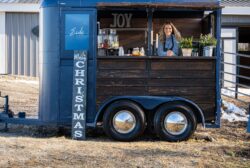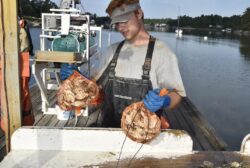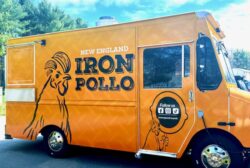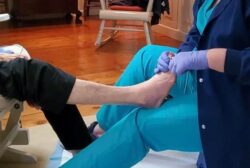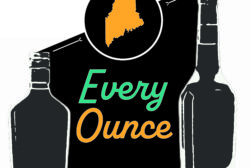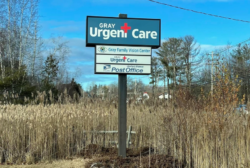Agriculture & Food Systems
 Agricultural businesses in Maine come in many sizes and shapes with varying markets and customers. However, very few have escaped the impact of the COVID-19 pandemic. For many, markets have been disrupted. For others, access to supplies has gone awry.
Agricultural businesses in Maine come in many sizes and shapes with varying markets and customers. However, very few have escaped the impact of the COVID-19 pandemic. For many, markets have been disrupted. For others, access to supplies has gone awry.
The nature of farming is to be adaptable and resilient. Seize the opportunity to look at your business afresh, so that you are stronger on the other side of the pandemic.
Moving Your Business Forward
We’ve compiled key information to consider as you move forward. As always, never hesitate to reach out to a Maine SBDC advisor for one-on-one assistance.
Now is the time to stop, review and assess the current state of your agricultural business. It’s important to assess the impact the pandemic has had and will continue to have on your business. Decisions you make now will have a long-lasting impact on your future and your ability to recover. To access your farm business, you should look at each aspect of your business and how it has been impacted by the pandemic.
Operations & Safety
- Greatest impact – What parts of your Ag business are most challenging due to the pandemic and new safety protocols? Is it farm operations? Sales? Both?
- Capacity – Have you had to limit service offerings and/or hours? Do you need to space out workers or customers in order to keep everyone safe? How much interaction do you (or your employees) need to have with customers and clients?
- Location – How is your location affected? Are there adjustments to the physical space that would help make things run smoothly or keep people safe?
- Employees – How are you keeping them safe? How many staff will you have working? Are you training them? Do you provide them with PPE? Do you need to update your employee handbook or create new procedures?
- Vendors – What are the critical supplies for your farm? Do you have a backup?
- Compliance – Do you need new equipment, materials, or PPE to keep your customers and employees safe?
- Mental health – How are you doing? Farming is normally stressful, pay attention to the mental health of yourself, your family and your workers. More here.
Finances & Financial Planning
- Revenue – What products are making money? What is your best-seller? What is your most profitable product? Which revenue streams have been most impacted? Are you selling direct to consumer, and cannot keep up with the CSAs? What is causing the impact on your revenue? Do your customers still have the means to pay for your services? Or have they become unemployed or have less income?
- Are your products or packaging sizes still relevant to your customers at this time?
- What might be deterring customers from purchasing your services?
- Have your customers traffic patterns changed? If they were purchasing from you at a week-day farmers market after work – are they still driving to work each day, or now working remotely?
- If you had to change your selling location, did customers know where to find you? And what hours you would be there?
- Have sales increased because of more customers buying local?
- Have you gained customers? Are your customers different this year?
- Expenses – How do your expenses look? How much are your fixed expenses? Are there expenses that can be cut? What expenses have increased because of the pandemic? Has labor increased because of more time cleaning or packaging? Or physical distancing when travelling to fields? Are expenses up because of spending for PPE and cleaning supplies?
- Cash & Working Capital – Have you determined how much cash your business has available to move forward? How long can you run your business at lower-capacity with the available resources? Will you need to look for additional financial resources?
Customers & Marketing
- Plan – When did you last update your marketing plan? Have you updated your marketing plan to be more digital and focused on engaging customers through web/social media platforms? Is your marketing consistent?
- Customers – How is your customer doing? Have their behaviors, spending, or habits changed? How will this impact your revenue? Are different customers purchasing from you than before? Have you lost some customers?
- Products – What is your best-selling product? Are there unique or new products or services you can offer based on the pandemic?
- Communication – How do you engage your customers? How do you make them feel safe? How do you communicate with them? Do you utilize the internet or e-commerce to promote and/or sell your products/services?
There is no question that rebuilding your business will take time, effort, and likely money. Consider the following as you work to capitalize on the ‘new normal’:
-
Reboot Operations
- Safety First: The State of Maine has compiled lists to help guide you. Visit your list from time to time as they do change. HERE . Implement new hygiene requirements (masks, single-use utensils, gloves). Redesign workspaces with the 6-foot physical distancing protocol in place.
- Staffing – Do you need to make changes to the staffing schedule to accommodate safety protocols? Staggered shifts? Clear written policies are essential for employees and customers. Talk with your attorney if you have further concerns related to liability. [link to free legal program}
- Suppliers – Communicate with suppliers about critical products. Do they have what you need? Do they anticipate shortages? Order early if necessary to ensure you have what you need.
- Packaging – Do you need to re-think your packaging to expedite handling with the customer transaction? Perhaps variety boxes to grab and go at the farmers market?
- Sales – Do you take pre-orders to expedite sales and contactless transactions? Is there a way for customers to buy online and pick up on the farm or market?
- Back to basics – Your land is your biggest asset. Have you had a soil test lately? Do you analyze your forage? Little things can make a difference. Are you feeding the livestock the appropriate feeds for their age and production? Consult with Cooperative Extension to maximize your nutrition plan. Do you irrigate crops? Check for leaks and unintended water loss. Is there a better system for doing so?
-
Financial analysis – implement the plan
- What is making your business money? Do you need to increase production of certain veggies? And conversely, drop some items or limit variety?
- Is it time for enterprise budgets on selected product lines? Or updating the existing ones? Prices have changed on many key supplies and ingredients in recent months – perhaps your prices also need to be adjusted in light of your enterprise budgets.
- Cash is king – do a cash flow projection to forecast your need for cash in the coming months.
- It is hard to run a farm and keep up with the bookkeeping during the busy season. Is it time to consider the benefits of a bookkeeper so that you know where the numbers are at any given time?
- Do you need extra funds? Better to go to the lenders sooner rather than run out of funds.
-
Revive Demand
- Determine that there is demand for your products among your existing customer base or target customers
- Make sure you are communicating new measures implemented that may not be visible to customers (i.e. minimized human handling, testing procedures across your entire supply chain) so they feel safe dealing with you.
- Identify and capture specific pockets of growth. Have an idea for a new product? Do a pilot project to test the market. Engage the customers in tastings or product feedback.
- Use tactical pricing. Don’t give your services away or discount your services without understanding your costs. Emphasize the value in your produce.
- Focus on building brand loyalty by demonstrating high ethical standards, like the use of PPE and constant communication.
- Make it easy for customers – facilitate online ordering and payments.
-
Communicate, Communicate, Communicate
- Update your customers regularly on the status of your business
- Did seed prices increase or the cost of compost? Resulting in a need to increase your prices? Communicate the reason for that increase to your customers.
- Stay in touch with your networks – with your ag associations, stakeholders, advisors, partners, customers, suppliers, friends, family, press, etc.
- Utilize social media and digital marketing outlets
- Do you have a website? Could it use a re-fresh? Do you tell your story there? Customers like to feel connected to the source of their food.
- Remember, your customers and employees are looking to you to let them know how you are going to keep them safe.
How long can your business last? Will you have enough cash to get you through the Winter? What if an employee gets sick or there is another surge in the virus? What are your next steps?
All of these questions – and more – can be answered to some extent by business planning. A business plan can be a simple assessment of where your business stands to help guide you and your future business decisions. But it does not have to be a long, elaborate document that takes months to complete. A business plan and the accompanying cash flow projections allow you to set specific goals. It also helps you better understand where you are and what you need to do to survive and succeed.
Planning helps you better understand “what if” scenarios.
Planning also helps you manage crises better. It helps you respond in a time of panic, providing guidance on situations that might arise and how to respond confidently. Trust us – your future self will thank you for taking this time to create a thoughtful plan.
AgPlan is a useful tool for drafting a business plan. It is online, gives prompts and examples for content, and can be shared with others. Other general business planning tips can be found on our website.
Feeling overwhelmed? Need help? Maine SBDC business advisors are experts in business planning. Our strength is that we can be a part of your team and help you review the big picture, discuss your goals and help you wade through the many options and resources to draft a plan to achieve those goals. We can work with you to put together a cash flow projection to be part of that road map. If you need funding, we can help you prepare the documents needed to accompany a loan application. Maine SBDC Business Advisors can guide you through the business planning process and help you feel confident about your next steps (and the future of your business).
REQUEST ADVISINGResources from Industry Organizations
Maine Department of AgricultureFunding & Resources for Agriculture and Food Businesses:
https://www.maine.gov/dacf/about/news/news.shtml?id=4256435
https://www.maine.gov/dacf/covid19/
This includes helpful information on food safety, financial resources, labor management, cleaning, and much more.
The University of Maine has extensive resources, particularly as you navigate pandemic. They provide pandemic information for Maine Farmers, a farm and seafood directly, best practices, FAQs, sales resources and more. You can also contact them with questions you may have. Visit their website here: https://extension.umaine.edu/agriculture/
We also recommend the Beginning Farmer Resource Network (also helpful for existing farmers), which is maintained by Maine Cooperative Extension. Visit them here: https://extension.umaine.edu/beginning-farmer-resource-network/covid-19/
USDA’s COVID Resources can be found here: https://www.farmers.gov/coronavirus
This includes helpful information on assistance programs, crop insurance, inspections, market concerns and much more.
Coronavirus Food Assistance Program 2 for Aquaculture Producers
Are you a farmer or rancher whose operation has been directly impacted by the coronavirus pandemic? USDA is implementing Coronavirus Food Assistance Program 2 for agricultural producers who continue to face market disruptions and associated costs because of COVID-19.
Coronavirus Food Assistance Program 2, or CFAP 2, will provide producers with financial assistance that gives them the ability to absorb some of the increased marketing costs associated with the COVID-19 pandemic. USDA will accept CFAP 2 applications from September 21, 2020 through December 11, 2020. Learn more at farmers.gov/cfap.
Maine’s resources for Organic Farmers: https://www.maine.gov/dacf/covid19/
The MOFGA Farmer Programs staff has compiled this clearinghouse of almost every topic and issue related to farming during the COVID-19 crisis, with links and information and resources about insurance, employees, farmers’ markets, online marketing, loans and grants, etc.
Maine Producer Safety Improvement Grant
Deadline December 15, 2020
The Maine Organic Farmers and Gardeners Association is pleased to announce the Maine Produce Safety Improvement Grants (MPSIG) opportunity. This grant will help all of Maine’s commercial specialty crop growers (not just MOFGA certified) implement on-farm food safety practices, transition to compliance with the Food Safety Modernization Act (FSMA) Produce Safety Rule (PSR) and meet market demands for on-farm food safety. Eligible producers includes growers of fruits and vegetables, tree nuts, dried fruits, horticulture, and nursery crops (including floriculture) but excluding commodity crops). Full details here


